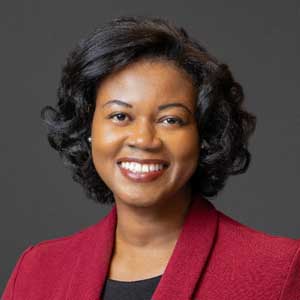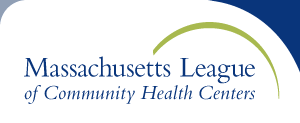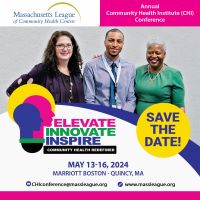IHE Celebrates our one year anniversary
The Institute for Health Equity Research, Evaluation, and Policy (IHE) was founded in July of 2023.
In honor of The Institute for Health Equity's one year anniversary, The Castle Group (TCG), which has collaborated with IHE over the past year, met with Dr. Cheryl Clark, executive director and senior vice president of IHE, who answered questions about our mission, accomplishments, and plans for the future.
Meet the IHE Team

IHE celebrates growth! After establishing ourselves in July with the hiring of our Executive Director and Senior Vice President Cheryl Clark, we then welcomed our Executive Assistant and Program Manager, Amanda Pickett, in August. Our Data Scientist, Dionyssois Mintzopoulos, joined the team in January, followed by our Senior Qualitative Research Scientist and Qualitative Data Analyst, Jeff Nicklas, in May.
IHE One Year Anniversary: An Interview with Cheryl R. Clark, MD, ScD, Executive Director of IHE

TCG: What are you proud of at 1 year?
CRC: Our mission is to advance emancipatory research, evaluation, and policy led by community health centers in Massachusetts. I am so proud of the energy and collaboration with health centers that we have enjoyed this year. We have learned from the equity mission of health centers, which is comprehensive and supports people across the entire state. This includes a commitment to end inequities in substance use, to improve social determinants of health, to support the workforce that delivers quality care in health centers, and to make sure that we are inclusive across identities including sexual orientation and gender identity.
We have been able to support the work of health centers in almost all of these areas. In just this short first year, Caring Health Center is working with us to extend bridges between clinical care and community based organizations to end inequities in substance use disorder.
Brockton Neighborhood Health Center, Codman Health Center, Mandela Yoga Project, Inc., and the Harvard Office of Diversity, Inclusion, and Community Partnership (DICP) are collaborating as part of the Harvard and the Legacy of Slavery: Reparative Partnership Grant Program to support career development and scholarship of youth and health center staff who are descendent of enslavement in the U.S.
We have been active in policy relevant conversations and have delivered legislative briefings to MA legislators hosted by the Black and Latino Legislative Caucus as well as state senators and representatives to emphasize the importance of equity in the approach to addressing Long COVID.
We have also been moved by the history of health centers.
The IHE Mission Committee celebrated the 60th anniversary of Freedom Summer with Reena Evers Everette, Executive Director of the Medgar and Myrlie Evers Institute in Jackson, Mississippi. The Evers family has championed Civil Rights and paved the way for activism from clinicians across the country that ultimately catalyzed the community health center movement.
We found it inspiring to have Executive Office of Health and Human Services (EOHHS) Undersecretary Dr. Kiame Mahaniah, who was previously CEO of Lynn Community Health Center, give the introduction for Mrs. Evers-Everette.
We collaborated across the Mass League, with Brigham and Women's Hospital, and with the Community Health Association of Mississippi to celebrate some of the leaders of the health arm of the Civil Rights movement through the Our Health Stories Project.
You can learn about the Our Health Stories project at ourhealthstories.today and on Instagram @our_healthstories.
We are grateful to have received mentorship on data from health centers.
Mattapan Community Health Center has been particularly supportive around data analytics. Their colon cancer screening rates are among the highest in the country.
It has also been inspiring through the year to spotlight the amazing work of leaders in health centers across the state.
Overall this has been an energizing start to IHE's journey to support the amazing work that continues under the leadership of community health centers across Massachusetts.
TCG: What is upcoming for the future?
CRC: We are beginning a collaboration with Boston Medical Center and Boston Health Net to improve hypertension control, a major contributor to unnecessary deaths.
We look forward to opportunities to improve maternal health data collection to support efforts to achieve equity in maternal health.
We are continuing to get to know health centers across the state for inspiration and opportunities to advance equity in research, evaluation and policy.
We look forward to broadening our reach to support more community health centers across the state and to welcoming partnerships with community organizations and others to support the research and evaluation mission of health centers.
In Case You Missed It: check out this year's interviews with health center leaders

Interview with Cristina Huebner Torres, PhD, MA, Chief Research and Population Health Officer at Caring Health Center
October newsletter featuring Hispanic Heritage Month
Community Health Centers deliver evidence-based practice to serve roughly one million patients in Massachusetts. In this interview, the work of Dr. Cristina Huebner Torres gives a powerful example of how community health centers translate knowledge to practice. Read more.

Interview with Sari Reisner, ScD, then Affiliated Investigator at The Fenway Institute and Director of Transgender Health Research, and faculty at Harvard University
November newsletter featuring Transgender Day of Remembrance
Dr. Sari Reisner shared his clinical and research expertise especially as it relates to improving equity in Transgender health. Read more.

Interview with Damian Archer, MD, Chief Executive Officer of Outer Cape Health Services
February newsletter featuring Black History Month
Dr. Damian Archer discussed the importance of leadership to achieve health equity, the ways that Community Health Centers serve diverse populations, sources of his inspiration, and more. Read more.

Interview with Sue Joss, Sheila Och, MPH, Tania Barber, and Elizabeth Browne, MBA
March newsletter featuring Women's History Month
Tania Barber (President & CEO of Caring Health Center), Elizabeth Browne (CEO of Charles River Community Health, Sheila Och (ED of Lowell Community Health Center's Health Justice Learning Institute) and Sue Joss (CEO at Brockton Neighborhood Health Center) explored adversity they faced to thrive in the positions they're in now.

Interview with Renee Crichlow, MD, FAAFP, Chief Medical Officer of Codman Square Health Center in Boston
April newsletter featuring National Minority Health Month
The discussion explored Dr. Crichlow's work, the importance of diversity in the health care workforce, and recommendations she has for the future. Read more.

Interview with Mimi Gardner, Vice President and Chief Equity Officer at NeighborHealth
May newsletter featuring Mental Health Awareness Month
This interview explored Mimi Gardner's experiences at NeighborHealth, the critical role of mental health services in healthcare, and her recommendations for building a more equitable future for behavioral health. Read more.
A year in IHE Media Highlights
 "New institute looks to shake up health equity research" in The Worcester Business Journal, June 23, 2023
"New institute looks to shake up health equity research" in The Worcester Business Journal, June 23, 2023 The Brigham Bulletin, July 12, 2023
 "A Comprehensive Journey Toward Health Equity: Dr. Cheryl Clark at The Helm" in The Seamless Connection: Slice of Health Care Network podcast, September 12, 2023
"A Comprehensive Journey Toward Health Equity: Dr. Cheryl Clark at The Helm" in The Seamless Connection: Slice of Health Care Network podcast, September 12, 2023 "UMass Chan Medical School Awarded Grant By RIZE Massachusetts," Worcester Patch, Jan 5, 2024
"UMass Chan Medical School Awarded Grant By RIZE Massachusetts," Worcester Patch, Jan 5, 2024UMass Chan Medical School Awarded Grant By RIZE Massachusetts, Worcester Patch, Jan 5, 2024
 "Women leaders from Greater Boston honored at awards luncheon" in The Boston Globe, October 19, 2023
"Women leaders from Greater Boston honored at awards luncheon" in The Boston Globe, October 19, 2023 "Long COVID and Health Equity in the Commonwealth: What we Know, What We Don't Know & What We Need To Know,"
"Long COVID and Health Equity in the Commonwealth: What we Know, What We Don't Know & What We Need To Know,"Hosted by Representative Mindy Domb, January 30, 2024
 "Q&A: Partnering with Community Health Centers to Advance 'Emancipatory Research'" in The Brigham Bulletin, July 12, 2023
"Q&A: Partnering with Community Health Centers to Advance 'Emancipatory Research'" in The Brigham Bulletin, July 12, 2023In 2023, The Massachusetts League of Community Health Centers (Mass League) created the Institute for Health Equity Research, Evaluation and Policy, Inc. (IHE), a 501(c)(3) non-profit organization designed to support Emancipatory research driven by community health centers.
Our mission is to promote and engage in community driven research, evaluation, and public policy to achieve health equality equity.
IHE convenes communities and supports the scientific infrastructure, implementation, program evaluation and training needed to identify and sustain the most effective strategies for attaining equity in health and healthcare, as defined by those with lived experience of health inequities.
Learn more about IHE on our webpage of the Mass League website and on our LinkedIn page.













